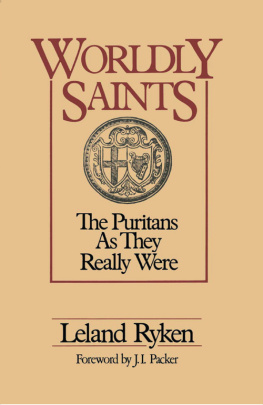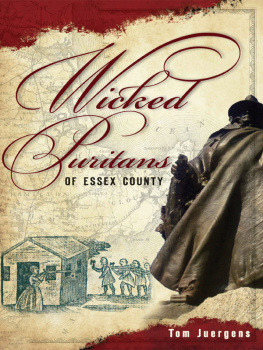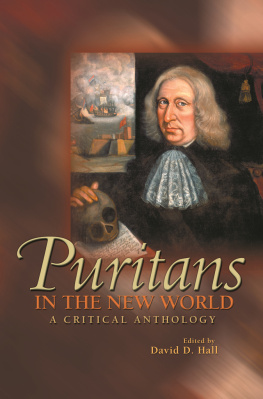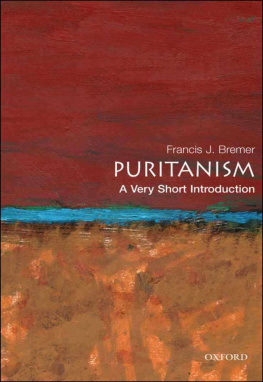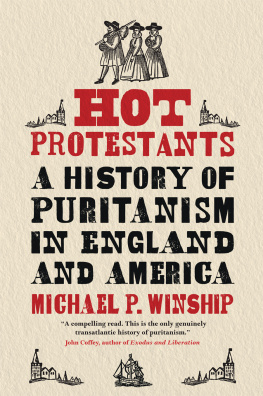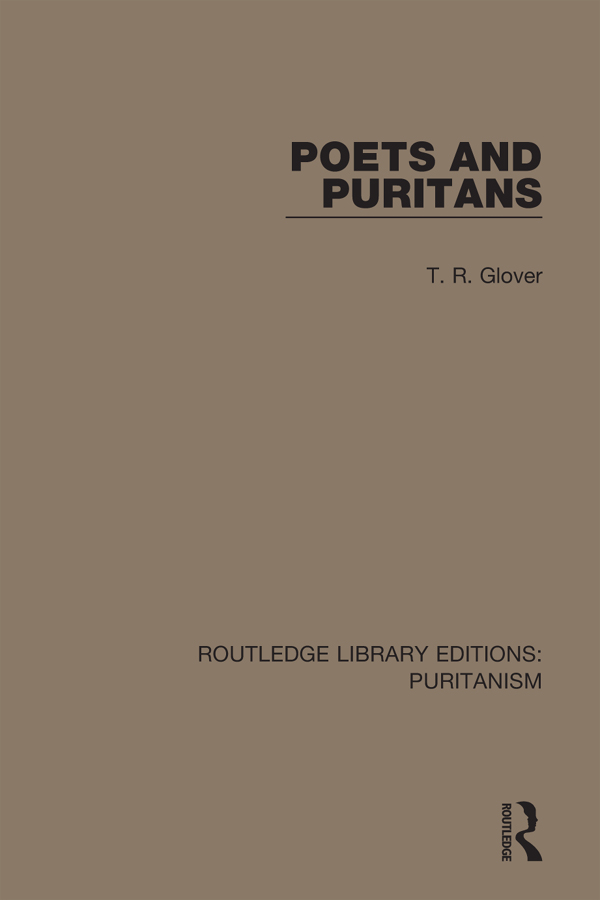
ROUTLEDGE LIBRARY EDITIONS: PURITANISM
Volume 5
POETS AND PURITANS
POETS AND PURITANS
T. R. GLOVER

First published in 1915 by Methuen & Co. Ltd.
This edition first published in 2021
by Routledge
2 Park Square, Milton Park, Abingdon, Oxon OX14 4RN
and by Routledge
52 Vanderbilt Avenue, New York, NY 10017
Routledge is an imprint of the Taylor & Francis Group, an informa business
1915 T. R. Glover
All rights reserved. No part of this book may be reprinted or reproduced or utilised in any form or by any electronic, mechanical, or other means, now known or hereafter invented, including photocopying and recording, or in any information storage or retrieval system, without permission in writing from the publishers.
Trademark notice: Product or corporate names may be trademarks or registered trademarks, and are used only for identification and explanation without intent to infringe.
British Library Cataloguing in Publication Data
A catalogue record for this book is available from the British Library
ISBN: 978-0-367-56981-5 (Set)
ISBN: 978-1-00-311164-1 (Set) (ebk)
ISBN: 978-0-367-62663-1 (Volume 5)(hbk)
ISBN: 978-1-00-311070-5 (Volume 5)(ebk)
Publishers Note
The publisher has gone to great lengths to ensure the quality of this reprint but points out that some imperfections in the original copies may be apparent.
Disclaimer
The publisher has made every effort to trace copyright holders and would welcome correspondence from those they have been unable to trace.
POETS AND PURITANS
BY
T. R. GLOVER

First Published in 1915
TO
MARGARET GILCHRIST FINLAY
AND
HUNTER GILCHRIST FINLAY
PREFACE
W ANDERING among books and enjoying them, I find in a certain sense that, the more I enjoy them, the harder becomes the task of criticism, the less sure ones faith in critical canons, and the fewer the canons themselves. Of one thing, though, I grow more and more sure,that the real business of the critic is to find out what is right with a great work of art, book, song, statue, or picture not what is wrong. Plenty of things may be wrong, but it is what is right that really counts. If the critics work is to be worth while, it is the great element in the thing that he has to seek and to findto learn what it is that makes it live and gives it its appeal, so that, as Montaigne said about Plutarch, men cannot do without it; why it is that in a world, where everything that can be scrapped is scrapped, is thrown aside and forgotten, this thing, this book or picture, refuses to be ignored, but captures and charms men generations after its maker has passed away.
With such a quest a man must not be in a hurry, and he does best to linger in company with the great men whose work he wishes to understand, and to postpone criticism to intimacy. This book comes in the end to be a record of personal acquaintances and of enjoyment. But one is never done with knowing the greatest men or the greatest works of artthey carry you on and on, and at the last you feel you are only beginning. That is my experience. I would not say that I know these men, of whom I have written, thoroughlya man of sense would hardly say that, but I can say that I have enjoyed my work, and that, whatever other people may find it, to me it has been a delight and an illumination.
T.R.G.
S t J ohns C ollege , C ambridge ,
February 1915.
CONTENTS
An acute young critic, who saw some of the proofs, has asked me, with a hint of irony, whether Evelyn and Boswell were Puritans or Poets. Any reader who has a conscience about the matter must omit these essays.
POETS AND PURITANS
S OME time ago I was reading the Faerie Queene, and one evening I laid aside the poem for a little. I was wishful to know what I ought to think of what I had read. I turned to the work of a biographer of Spenser, and I happened upon the place in which he sets out the faults of the poem. I found that the allegory breaks down, that it is diffuse and inconsequent, that two or even three or four figures may stand for one thing; and again that the allegory is crossed by contemporary history hardly disguised at all, and is complicated with pagan mythology; that the poet is guilty of affectation of the antique in the structure of his scheme, the garbs and habits of his knights, and in his own language; in fact, that Ben Jonson was right in saying Spenser writ no language ; that some of his passages, if innocent in intention, are hardly to be innocently read; and finally that the flattery of Queen Elizabeth, which pervades the whole, is excessive, and indeed a gross flaw upon the art and character of the poet.
The doubt came to my mind as to whether it were worth while to go on reading such a poema doubt that must often occur to those who read criticism. Happily this time I laid the critic down and took the poet up again, and read on till the Blatant Beast was captured by Sir Calidore, though to be sure, as the poet says and as I had perhaps reason to believe, it escaped, and goes barking and biting
Dean Church. Mr J. W. Mackail, in his Springs of Helicon, adds several other counts to the indictment.
Ne spareth he the gentle Poets rime.
The poet, once accepted, had made his own impression despite the faults which the criticit is true, an admiring critichad found in him. But now I was thrown back on another question which I had to solve, for the unexamined life is after all, as Plato said, un-live-able for a human being. What was it that had triumphed over the defects of the Faerie Queene? Why had it been such a prolonged happiness to read it, and why did it leave so strong a sense of a permanent enrichment of ones life?
There can be no doubt that one great cause of this is the power of sheer beauty over the mind. It invades and it penetrates, and insensibly it brings peace.
O! turne thy rudder hitherward awhile
Here may thy storme-bett vessell safely ryde,
This is the Port of rest from troublous toyle,
The worldes sweet In from paine and wearisome turmoyle (ii. 12, 32).
Such a sweet In many a weary heart has found in the beauty of the Faerie Queene. But then a question may again be raised. These lines come from the song of the Mermaids. Is the peace that the great poem brings a vanity from which the Palmer with temperate advice would discounsel us? Can we trust it? In his Hymne in Honour of Beautie the poet suggests that we can.
Therefore where-ever that thou doest behold
A comely corpse, with beautie faire endewed,
Know this for certaine, that the same doth hold
A beauteous soule, with fair conditions thewed,
Fit to receive the seede of vertue strewed;
For all that faire is, is by nature good;
That is a signe to know the gentle blood.
(H. Beautie, 134.)
No one, who read the Faerie Queene with an open heart, could think of Spenser as anything but one of the most deeply sincere of poets. For some his poetry lies too far away from the real. Yet if we watch our words, we have to own that there are two reals, and that Spenser takes us from the accidental-real into the ideal-realwhich he at least as a loyal Platonist and true mystic would call the true world.
Next page


